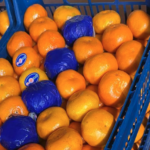EU seeks glyphosate extension, tells countries 'the ball is in your court'

The European Commission is requesting an 18-month extension for the use of glyphosate.
EU Commissioner for Health and Food Safety, Vytenis Andriukaitis, made a statement yesterday (June 1) saying he wanted to reiterate, 'the ball is now in member states' court'.
As the EU license is due to expire on glyphosate at the end of June there continues to be split opinion across European member states.
On Monday June 6 an Expert Committee will meet to discuss the file once again and take a vote 'on the basis of a limited extension of the current approval', pending a new study into the safety of glyphosate by the European Chemicals Agency, due next year.
According to Andriukaitis, even though a majority of member states is in favor of the renewal, no qualified majority has been reached and some countries have 'been reluctant to take a position'.
"I believe it is important to clarify that once an active substance is approved, or renewed at EU level, it is then up to Member States to authorise the final products (the herbicides and pesticides themselves) put on their respective markets.
"The EU approval of an active substance only means Member States can authorise plant protection on their territory, but they are not obliged to do that.
"The Member States who do not wish to use glyphosate based products have the possibility to restrict their use. They do not need to hide behind the Commission’s decision.'
He adds that if there is no EU approval, there is no choice for member states other than withdrawing the authorizations for plant protection products containing glyphosate from their markets.
“I want to stress again that the EU’s authorisation procedure as regards pesticides is the strictest in the world. It takes years of scientific assessment before an active substance is authorised, or renewed at EU level,” he says.
“Our scientific process is very stringent and relies on pooling of expertise between the European Food Safety Authority and all 28 Member States.
“Our proposals and decision on glyphosate were based on the guided assessment done by EFSA and before it, German Federal Institute for Risk Assessment. They both concluded that glyphosate is unlikely to be carcinogenic.”
France is against the use of glyphosate and Germany is understood to be on the fence.
Andriukaitis' speech made no mention of the standpoint of each individual member states and www.freshfruitportal.com received no clarification from the Commission on this point at the time of writing.
However, campaign director for Avaaz, a campaign group that organized a petition calling for glyphosate to be banned, says 'that’s the million dollar question' and cites both France and Germany as against.
"The Germans have come out today saying they don’t support the Commission’s statement and the same for the French.
"We don’t know the positions of lots of the other countries. Now they are all putting their positions together.
"What we are trying to work out is if those countries that abstained from the vote last time around will be happy with this proposal, because it’s an extension and not a re-licensing and then is dependent on the assessments coming out at some point next year."
He claims that growing public concern over the safety of glyphosate has forced governments and the Commission to move from 'greenlighting a 15-year license to an 18-month emergency extension.'












































